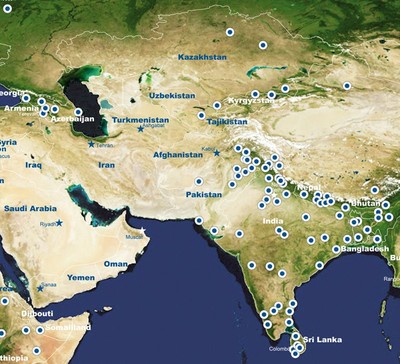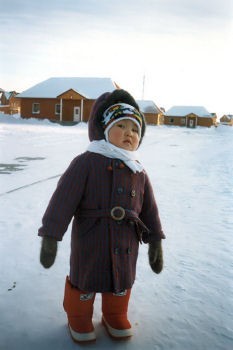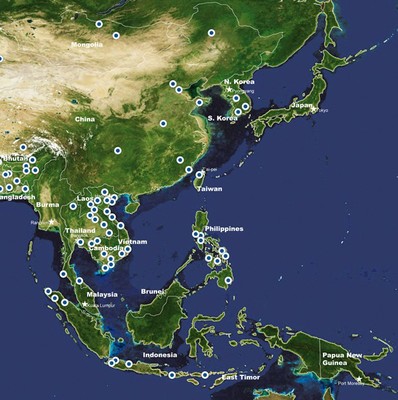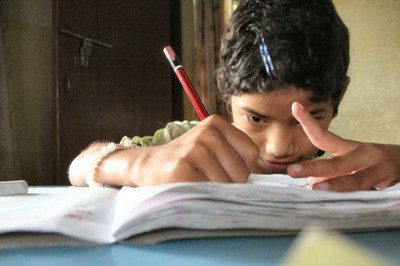Sponsor a Child in Asia
In Asia, we currently care for approximately 27,000 sponsored children in 149 SOS Children's Villages. Some of these children have joined an SOS Children's Village as a result of one of Asia's natural disasters in the last decade, including the Asian Tsunami and the Kashmir earthquake.
Our Family Strengthening Programmes, SOS Medical Centres and SOS Social Centres provide services for about a quarter of a million more children and their families.
By sponsoring a child in Asia, SOS Children will provide a loving home to a child who may have been orphaned or abandoned.
Please note that several of the SOS Children's Villages in Asia, particularly in India and Pakistan, are now self-sufficient with the generous support of local supporters and sponsors. In these Villages, supporters from the same country as the SOS Children's Village pay for child sponsorships and construction projects. We believe this is a positive step for our charity and it allows our work to develop in new areas.
 SOS Central Asian Child Sponsorship
SOS Central Asian Child Sponsorship
Armenia
Following a devastating earthquake in Armenia in 1988, we constructed an SOS Children's Village for orphaned children in the town of Kotayk, just outside the area that had been destroyed and about 10 miles from the capital Yerevan. A second Village later opened in Idjevan.
Azerbaijan
At present SOS Children support over 9,600 people in Azerbaijan through two SOS Children’s Villages, one SOS Youth Home, one SOS Nursery School, one SOS Playbus and two SOS Family Strengthening Programmes.
Bangladesh
In Bangladesh we currently run five SOS Children’s Villages. Bangladesh is prone to extreme weather conditions. SOS Children’s Village Chittagong was built after severe flooding, and also doubles up as a cyclone shelter.
Georgia
In Georgia we operate two SOS Children’s Villages. One is located in the capital Tbilisi, and is supported by Family Strengthening Programmes and an SOS Playbus. The other is located in the country’s second city, Kutaisi.
India
India is home to the largest amount of SOS Children’s Villages in the world. We run 33 SOS Children’s Villages throughout the country. In total we support 58,000 people. The SOS Children's Villages are located all over the vast country.
 Kazakhstan
Kazakhstan
Our most recent SOS Children's Village in Kazakhstan was opened in 2004. We have three villages now in the country, including one in the capital Astana.
Kyrgyzstan
There are two SOS Children's Villages in the north of Kyrgyzstan, one in the capital Bishkek, the other in Cholpon Ata.
Nepal
A ninth SOS Children's Village opened in Nepal in March 2010 in Lumbini, in the west of the country. The SOS Children's Village consists of 15 family houses which can provide a new home for up to 150 children. We have been working in Nepal since the 1970s.
Pakistan
We began working in Pakistan in 1977 when the first community was built in Lahore. Today, this SOS Children's Village is considered a model for modern child care in Pakistan. After the earthquake in Kashmir in 2005, SOS Children was named legal guardian of all unaccompanied children. An Emergency Relief Programme was initiated by us following the 2010 flooding.
Please note that child sponsorship works slightly differently in Pakistan. See our Pakistan page for more information.
Sri Lanka
Since August 2009, following the climax of the civil war, SOS Children has been running a childcare centre at the huge Chettikulam refugee camp close to the city of Vavuniya in northern Sri Lanka. The childcare centre provides temporary shelter, education and care to around 200 children orphaned or separated from their families. There are five SOS Children's Villages on the island.
Uzbekistan
We began working in Uzbekistan in 1999 with the construction of SOS Children's Village Tashkent, on land donated by the government. A second SOS Children's Village in Uzbekistan opened in the ancient city of Samarkand in 2007.
 SOS South East Asia and China Child Sponsorship
SOS South East Asia and China Child Sponsorship
Cambodia
As nearly 10% of children in Cambodia are orphans, the need for our work is great. We run three SOS Children’s Villages in Cambodia, including a village in Phnom Penh, the capital.
China, People’s Republic of
We run nine SOS Children’s Villages in China, including Villages in large cities like Beijing and Tianjin. There is also a village in Lhasa, on the Tibetan Plateau and a village in Urumqi, in the west of the vast country.
Indonesia
Three of our eight SOS Children’s Villages in Indonesia: Banda Aceh, Medan and Meulaboh, located in Northern Sumatra, were built directly as a result of the Asian Tsunami in 2004.
South Korea
Our community in Daegu, in South Korea, was the first SOS Children's Village opened in Asia. It was constructed in 1965. Since then, two more SOS Children's Villages have been opened in South Korea, including a Village in the capital Seoul.
Laos
Since we started working in Laos in 1995, we have opened six SOS Children's Villages in the country. The sixth SOS Children's Village was recently opened in Savannakhet in the south of the country. It has 15 family houses, an SOS Nursery School and an SOS Social Centre.
Mongolia
At present we support over 700 people in Mongolia through two SOS Children’s Villages, one SOS Youth Home, one SOS Social Centre and one SOS Vocational Training Centre.
Philippines, The
We run eight SOS Children's Village in the Philippines. On top of this, SOS Children runs SOS Schools, SOS Vocational Training Centres and Family Strengthening Programmes (FSPs) in the Philippines. FSPs aim to stop child abandonment and to keep families together, by providing child care, counselling, vocational training and medical support. In total, through all of our programmes (including the Villages and the FSPs) we are reaching more than 6,700 Filipinos.
Thailand
SOS Children began its work in the country in 1972. The fifth SOS Children's Village in Thailand was opened in Phuket in 2008. The community was established to help children in the southern region, particularly children who had lost their families in the Tsunami disaster.
Vietnam
We operate 13 SOS Children's Villages in Vietnam, from the north to the south of the country. The most recent, Dien Bien Phu, was opened in December 2009.
 The Story of SOS Child Sponsorship in Asia
The Story of SOS Child Sponsorship in Asia
The first SOS Children's Village in Asia was opened in South Korea in 1965. The sensational 'Rice Grain' fund-raising campaign made it possible to open a village in Daegu for Korean War orphans, which was the first SOS Children's Village outside of Europe.
The family-based concept was integrated smoothly into the cultural context of most Asian countries. Another important aspect is that SOS Children is an apolitical and secular organisation which carries out its activities in each country as a local association, employing local people. SOS Children requires permission from the relevant government to begin working in its country. The fact that SOS Children is classed as a national and unbiased organisation in the countries we work in makes it possible for us to become involved in many cases, such as in Sri Lanka.
India now has the most SOS Children's Villages in the world. There are also eight SOS Children's Villages for Tibetan children, two of which, Dharamsala and Leh-Ladakh, are the biggest in the world. Nepal also has villages and facilities specifically for Tibetan children, who grow up according to their own culture and religion and speaking their own language. Since 2000 there has even been an SOS Children's Village in Lhasa, in the Tibet Autonomous Region and there are nine in total in China.
After the collapse of the Soviet Union, SOS Children was also able to gain a foothold in Central Asia, where the provisions for and the care of orphans was a great cause for concern. The social transformation experience also stretched increasing numbers of families to the limit; alcoholism, neglect and poverty meant that many children did not receive adequate care or had to live elsewhere. Our first village in Georgia marked the beginning of a quick growth in villages in 1996. Projects followed in Kazakhstan, Kyrgyzstan, Azerbaijan and Uzbekistan. It was finally possible to open an SOS Children's Village in 2002 in Ulaanbaatar which is the capital of Mongolia.
SOS Children's work in Asia has not always been easy, as
a result of political events and influence. One of the saddest moments
came in 1976 when children, mothers and staff members were forced to
flee the SOS Children's Villages in Da Lat and Go Vap in Vietnam. SOS Children was not able to return to work in Vietnam until 1987. There are now twelve SOS Children's Villages in the country.
SOS Children's work in Asia has increasingly been characterised by emergency relief action, which has often been followed by the construction of SOS Children's Villages and other social facilities. In the aftermath of environmental and natural disasters and political unrest in India (violent conflicts in Assam and Kashmir, a poisonous gas leak in Bhopal, floods and storms in Visakhapatnam and Orissa, earthquakes in Latur and Gujarat) and after the devastating earthquake in Pakistan in 2005, SOS Children has been at work. In Pakistan, SOS Children also provided support for stranded Afghan refugees, particularly through its medical and educational facilities.
SOS Children's largest Emergency Relief Programme to date, which was spread out over several countries, was the relief programme that was launched following the tsunami disaster on 26 December 2004. As part of the immediate emergency relief in Indonesia, Sri Lanka, India and Thailand, a total of 2,232 family houses were built. On top of this 18 community centres, three SOS Social Centres and six SOS Children's Villages were constructed, over a period of three years. In addition, more than 340 fishing boats were made available. This emergency relief and reconstruction aid was made possible because people in Europe were impressively willing to make donations. Considerable donations were also made in the countries themselves (such as in India).

 Return to Schools Wikipedia Home page…
Return to Schools Wikipedia Home page…
